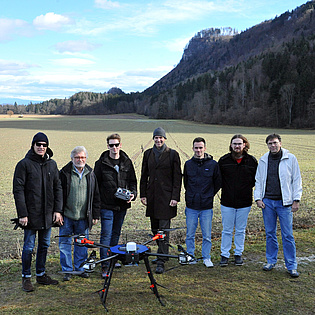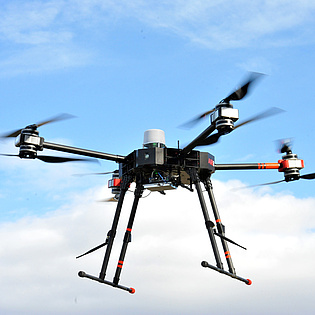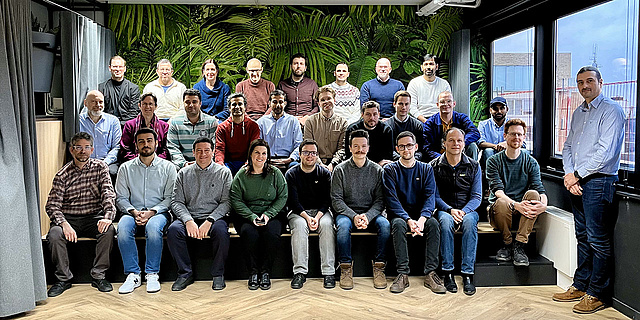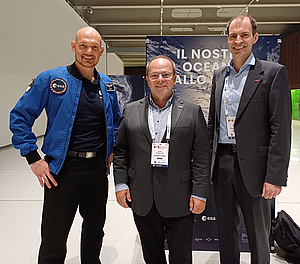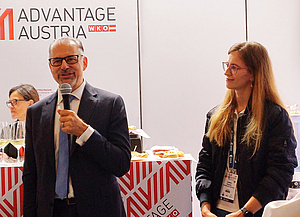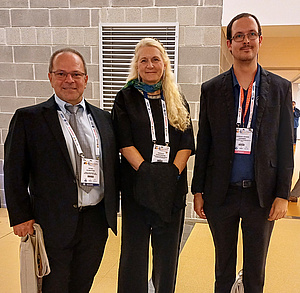ESA project UAV-3S_4D-Aerospace - Field campaign
Satellite connectivity will be essential for many of the scenarios for which drones will be used in the future. For the ESA Project UAV-3S (https://connectivity.esa.int/projects/uav3s4daerospace), an end-to-end system simulator is developed that provides performance indicators which are key for the development of future UAV satellite terminals.
On January 27, the team of UAV-3S carried out test flights near the premises of AIR6 SYSTEMS outside of Klagenfurt in order to gain satellite connectivity and drone telemetry data. The final drone flight simulator shall be able to predict the performance of any satellite link in various flight and drone scenarios.
(30.1.2025)
AMBIENT-6G kick-off
The AMBIENT-6G consortium kicked off its research activities during a two-day meeting at IMEC’s premises in Antwerp, Belgium, on January 28 and 29, 2025. The consortium, comprising 11 partners from 6 European countries, got together to discuss their relevant prior research, and the first steps towards achieving the project’s ambitious objectives.
(29.01.2025)
IAC 2024 Milan
The International Astronautical Congress (IAC) is the biggest yearly space event and is organized by the International Astronautical Federation (IAF). The last IAC took place in October 2024 in Milan and was co-hosted by the Italian Association of Aeronautics and Astronauts (AIDAA), the Italian Space Agency (ASI) and Leonardo.
Multiple members of our institute were present. Andreas Hörmer presented his papers "Comparative Analysis of Ground and In Orbit Thermal Performance of the PRETTY Cubesat SDR Platform" and "Enhancing Data Transfer with an IP Interface on the PRETTY Cubesat". Franz Teschl took part in multiple meetings and elections and together with Peter Schrotter engaged in advertising the SpaceTech Master programme.
There were numerous discussions with high-profile personalities like Alexander Gerst and many interested persons. Also ESA Director General Josef Aschbacher and ESA Reserve Astronaut Carmen possing visited the Austria booth, a wonderful opportunity for common photos and talks.
(31.10.2024)
IAC 2024 Mailand
Der International Astronautical Congress (IAC) ist das größte jährliche Event der Raumfahrtbranche und wird von der International Astronautical Federation (IAF) veranstaltet. Der letzte IAC fand im Oktober 2024 in Mailand statt und wurde mitorganisiert durch die Italienische Gesellschaft für Luft- und Raumfahrt (AIDAA), die Italienische Raumfahrtagentur (ASI) und durch Leonardo.
Mehrere Mitarbeiter unser Instituts waren vor Ort dabei. Andreas Hörmer präsentierte seine Veröffentlichungen "Comparative Analysis of Ground and In Orbit Thermal Performance of the PRETTY Cubesat SDR Platform" sowie "Enhancing Data Transfer with an IP Interface on the PRETTY Cubesat". Franz Teschl nahm an diversen Meetings und Abstimmungen teil und bewarb zusammen mit Peter Schrotter das SpaceTech Masterprogramm.
Es gab zahlreiche Gespräche mit hochrangigen Persönlichkeiten wie Alexander Gerst sowie vielen Interessierten. Auch kamen beispielsweise der ESA Generaldirektor Josef Aschbacher und unsere ESA Reserveastronautin Carmen Possnig am Österreich-Stand vorbei, eine wunderbare Gelegenheit für gemeinsame Fotos und Gespräche.
(31.10.2024)
NXP Lab Opening
The NXP laboratory for wireless communications and sensing was opened together with NXP. Visit this link for the full article about the NXP Laboratory for Sensing, Localization and Communication, officialy opened on 13.11.2023.
"UWB technology enables extremely precise localization as well as fast data transmissions over short distances. The new UWB measurement laboratory is intended to promote innovation and UWB application in areas such as communications, positioning and sensor technology. For example, testing localization algorithms. The funds are designated primarily for the financing of laboratory equipment to measure system performances, such as optical tracking systems."
(13.11.2023)
REINDEER kick-off
The H2020 project REINDEER was kicked off today, with the first meeting of the consortium consisting of partners from industry and academia. Find out more here! The project will run until the end of 2024, investigating the capabilities of flexible, distributed infrastructure consisting of large aperture antenna arrays.
REINDEER stands for REsilient INteractive applications through hyper Diversity in Energy Efficient RadioWeaves technology. As a joint work of academic and industry partners, the REINDEER project will develop a new smart connect-compute platform with a capacity that is scalable to quasi-infinite, and that offers perceived zero latency and interaction with an extremely high number of embedded devices. It will thereto develop “RadioWeaves” technology, a new wireless access infrastructure consisting of a fabric of distributed radio, computing, and storage resources which function as a massive, distributed antenna array.
We will develop protocols and algorithms to establish novel resilient interactive applications that require ‘real-time’ and ‘real-space’ cooperation, for future robotized industrial environments, immersive entertainment, and intuitive care. We will co-design focusing algorithms and protocols for enhanced interaction with many energy-neutral devices. REINDEER will provide experimental proof-of-concept in versatile testbeds. The project will reinforce the European technological leadership and the innovation will create new business opportunities.
(01.01.2020)
